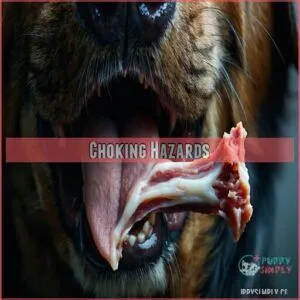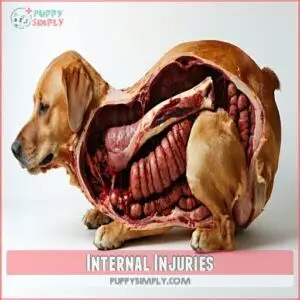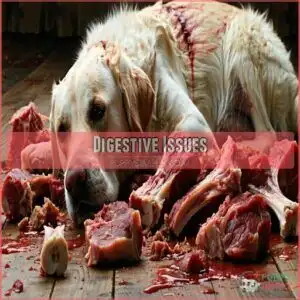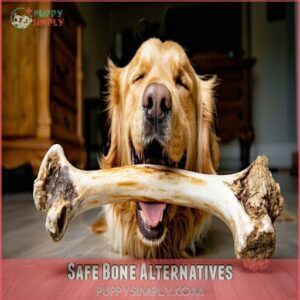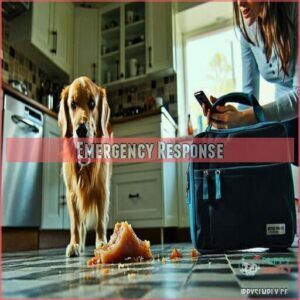This site is supported by our readers. We may earn a commission, at no cost to you, if you purchase through links.

Cooked pork chop bones can easily splinter, causing choking, broken teeth, or even severe internal injuries. Raw bones might seem safer, but pork bones are often brittle and risky, no matter the preparation.
High fat content in pork can also upset your dog’s stomach or lead to serious conditions like pancreatitis.
If your dog enjoys chewing, opt for safer alternatives like raw beef bones, synthetic bones, or vet-approved chew toys. Protecting your pup’s health is worth it—there are plenty of safe choices to keep their tail wagging, and avoiding pork chop bones is a good way to prevent severe internal injuries and ensure your dog’s overall well-being, including preventing serious conditions.
Table Of Contents
- Key Takeaways
- Risks of Pork Bones
- Can Dogs Eat Pork Bones
- Safe Bone Alternatives
- Emergency Response
- Nutritional Considerations
- Frequently Asked Questions (FAQs)
- Are Pork Chop bones good for dogs?
- How to monitor a dog after it eats a pork bone?
- What happens if a dog eats a pork chop bone?
- Can dogs eat pork bones?
- Can I give my dog a piece of pork chop?
- Can dogs have cooked chop bones?
- Is it safe to give my small dog a pork bone?
- How can I tell if my dog has an intestinal blockage?
- What is the best way to dispose of bones after my dog is done with them?
- Are there specific breeds more at risk?
- Conclusion
Key Takeaways
- Don’t let your dog eat pork chop bones—cooked or raw—as they can splinter, causing choking, internal injuries, or blockages.
- High fat in pork bones can upset your dog’s stomach or lead to serious conditions like pancreatitis.
- Choose safer alternatives like raw beef bones, synthetic bones, or vet-approved chew toys.
- If your dog swallows a pork bone, monitor for symptoms like vomiting or discomfort and contact your vet immediately.
Risks of Pork Bones
Feeding your dog a pork bone might seem harmless, but it can actually be dangerous. These bones can splinter or cause choking, internal injuries, and other serious health issues.
Pork bones may seem harmless, but their splintering can cause choking, internal injuries, or life-threatening risks for your dog.
Choking Hazards
Pork bones can be a choking hazard for dogs. They’re brittle and splinter easily, creating dangerous risks.
Know these facts:
- Small bones increase swallowing risks for big dogs.
- Splinters can lodge in the throat or block airways.
- Breed matters—small dogs struggle with big bone sizes.
- Always monitor chewing to prevent choking.
Raw bones harbor bacteria, posing additional health risks. Prioritize your dog’s safety over risky treats.
Internal Injuries
When chewing bones, sharp fragments can break off, causing serious harm.
Bone splintering may lead to esophageal tears or intestinal perforation. This damage can result in abdominal pain, intestinal blockages, or even a life-threatening peritonitis risk.
Dogs with internal injuries might need surgical intervention. Esophagus damage and other gastrointestinal issues often show as vomiting or sudden discomfort—immediate vet care is essential, due to the potential for life-threatening conditions.
Allergic Reactions
Certain dogs may react badly to a pork chop bone due to food allergies. Symptoms of allergies include itching, swelling, or upset stomach.
Identifying allergens can be tricky, and some breeds are more at risk.
- Frequent itching or licking.
- Digestive troubles like vomiting.
- Red, inflamed skin spots.
- Breathing difficulties.
- Persistent ear infections.
Allergy testing and veterinary care help keep dog health on track, which is crucial for managing digestive troubles.
Digestive Issues
Eating the wrong bone can upset your dog’s digestion and cause diarrhea or vomiting.
Eating the wrong bone may trigger digestive troubles, leading to diarrhea, vomiting, or serious health risks—choose safer options for your dog!
Fatty foods like pork bones may trigger pancreatitis, a serious risk.
Cooked bones splinter easily, harming the digestive tract or causing an intestinal blockage.
Sudden dietary changes also stress dog digestion.
Always prioritize safe chew options to avoid gastrointestinal upset and long-term digestive issues.
Can Dogs Eat Pork Bones
No, dogs shouldn’t eat pork bones, especially pork chop bones. These bones can splinter easily, creating sharp edges that might harm your dog’s throat, stomach, or intestines.
Splintered bones may even lead to choking or blockages, requiring emergency care. Cooked bones are even riskier because they’re more brittle and prone to shattering.
The high fat content in pork bones can also upset your dog’s stomach, causing diarrhea or vomiting. Social media often glamorizes giving bones to dogs, but real bone dangers outweigh any supposed benefits.
If your dog craves something tasty, consider safer alternatives like veterinarian-approved treats or even bone broth. Always follow veterinary advice to guarantee dog bone safety and steer clear of these unnecessary risks.
Consider the choking and obstruction risks when evaluating bone options for your dog. Safety first!
Safe Bone Alternatives
Instead of pork chop bones, you can choose safer options for your dog to chew.
Raw cow bones, synthetic bones, and sturdy chew toys are great alternatives that lower the risk of injury.
Raw Cow Bones
Raw cow bones can be a safer choice for dogs than a pork chop bone.
They’re sturdy and less likely to splinter.
Choose large bones—like hips or femurs—to match your dog’s size, guaranteeing proper bone safety.
Always find raw bones from trusted sources and supervise chewing closely.
Raw bones offer benefits such as improved dental health.
Proper preparation guarantees bone benefits without the risks of choking or injury.
Beef Bones
Beef bones are a safer option for your dog when chosen wisely.
Stick to large, raw bones like knee joints or ribs to avoid choking. Cooked beef bones are brittle and might splinter, putting your dog at risk.
Many owners purchase dog beef bone products for their pets.
- Bone Size: Pick one too big to swallow.
- Raw vs. Cooked: Raw bones are safer.
- Chewing Benefits: Supports dental health.
Synthetic Bones
Synthetic bones are safer for dogs than real ones.
They’re made from durable materials, reducing splinter risks.
Plus, synthetic chews help clean teeth and keep dogs entertained.
You can find many synthetic dog bone options online.
Check out this quick comparison:
| Feature | Synthetic Bones | Real Bones |
|---|---|---|
| Material Composition | Non-splintering resin | Bone or cartilage |
| Bone Durability | Long-lasting | Breakable |
| Chew Toy Safety | High | Low |
| Dental Benefits | Yes | Yes |
| Toy Recommendations | Kong, BetterBone | Large cow bones |
Synthetic bones offer several benefits, including reduced splinter risks and dental benefits.
They are a great alternative to real bones, providing a safe and entertaining option for dogs.
Chew Toys
If synthetic bones aren’t your thing, chew toys are a safe bet for dogs.
Opt for durable, interactive, or puzzle toys made from non-toxic materials. These satisfy chewing habits while avoiding splinters or blockages. Plus, they keep your dog’s mind busy and prevent boredom.
- Toy Safety: Go for tough, non-toxic options.
- Durable Toys: Choose hardy, long-lasting toys.
- Interactive Toys: Keep dogs entertained.
- Puzzle Toys: Challenge clever chewers!
Emergency Response
If your dog eats a pork chop bone, you’ll need to act quickly to keep them safe.
Knowing what steps to take and when to call the vet can prevent serious problems.
Removing The Bone
If your dog gets hold of pork chop bones, act quickly to prevent a choking hazard.
Use manual removal or bone removal tools gently, but avoid pushing the bone deeper. The Heimlich maneuver can help if choking occurs.
If removal fails or internal damage seems likely, seek veterinary assistance right away. Dog safety means staying alert to dog bone dangers!
Monitoring for Symptoms
After removing the pork chop bone, keep a close eye on your dog.
Watch for vomiting signs, breathing difficulties, appetite changes, or lethargy. Abdominal pain or unusual behavior could mean trouble from bone ingestion risks.
These dog symptoms might signal choking hazards or injuries. Monitoring health is key since prompt attention can prevent small issues from becoming bigger problems, and it requires careful observation to identify potential trouble.
Seeking Veterinary Care
If your pup eats a pork chop bone, knowing when to call for veterinary care is essential.
Symptoms to watch include choking, vomiting, or trouble pooping. Emergency protocols might be needed if sharp fragments cause issues inside.
Veterinary costs vary, but quick action can save lives. Always prioritize post-ingestion care to avoid serious dog health risks from pork chop bones.
Preventing Further Complications
Protect your dog’s health by acting quickly after ingestion.
Prevent complications with these steps:
- Post-Ingestion Care: Remove any leftover bone fragments and keep an eye on your pet.
- Monitoring Symptoms: Watch for choking, vomiting, or unusual behavior.
- Veterinary Intervention: Seek emergency veterinary care if problems arise.
Remember, bone dangers in dogs are serious—don’t take chances with their safety!
Nutritional Considerations
You might think pork bones are a natural source of nutrients for your dog, like calcium or minerals, but they come with risks.
High fat content and other dangers can outweigh the benefits, so it’s important to understand safer options.
Calcium and Mineral Benefits
Pork chop bones aren’t the safest option, but bones can have nutritional value when sourced properly.
Raw meaty dog bones provide calcium, phosphorus, and trace minerals important for nutrient absorption. Bone marrow adds extra benefits, supporting overall health.
Cooked bones splinter easily, posing a significant risk to your dog’s health.
For safer options, consider bone broth or large raw cow bones as healthy mineral sources while ensuring your dog’s safety and overall health.
Dental Health Benefits
Chewing helps with teeth cleaning, but pork bones aren’t safe for this.
Splintering risks outweigh any benefit.
Instead, try safer options for dog dental health:
- Dog chews made for cleaning teeth.
- Bone broth, a tasty choice for gum health.
- Synthetic bones for plaque removal and tartar control.
- Large raw bones (like cow femur).
Keep chewing habits safe!
Risks of High Fat Content
High fat content in pork chop bones can cause pancreatitis, diarrhea, or vomiting, making fat digestion tough for many dogs.
These pork bone risks also include long-term digestive problems and weight gain if not handled carefully.
Dietary adjustments, like trimming visible fat and limiting portions, help protect your dog’s health, focusing on balanced dog nutrition overall, which is a smarter approach to ensure your dog’s well-being, including preventing issues like weight gain.
Alternative Sources of Nutrition
If pork chop bones are off the menu, don’t worry—there are great ways to keep your pup healthy.
Balanced nutrition matters, and here are safe treat options:
- Bone broth benefits: Adds flavor and nutrients.
- Alternative dog chews: Durable, safe choices.
- Natural dog treats: Simple and healthy.
- Veterinary advice: Personalized diet tips.
- Dog nutrition tips: Whole foods like carrots!
For a different approach, consider that vegan diets require planning to guarantee adequate nutrients.
Frequently Asked Questions (FAQs)
Are Pork Chop bones good for dogs?
Bones might seem like a treat, but pork chop bones can crack like glass when chewed.
They splinter easily, risking choking, internal injuries, or blockages.
It’s best to skip them and pick safer alternatives.
How to monitor a dog after it eats a pork bone?
Keep an eye on your dog for signs like vomiting, drooling, or trouble pooping.
Watch for changes in appetite or behavior.
If something feels off, call your vet fast—better safe than sorry.
What happens if a dog eats a pork chop bone?
Did you know over 90% of cooked pork bones splinter easily?
If your dog eats one, it risks choking, internal cuts, or blockages.
Watch for vomiting, drooling, or discomfort, and contact your vet immediately.
Can dogs eat pork bones?
It’s risky to let your dog chew on pork bones.
They splinter easily and can cause choking, blockages, or internal injuries.
Stick to safer options like raw beef bones or dog-friendly chew toys instead.
Can I give my dog a piece of pork chop?
A pork chop might seem like a tasty treat, but it’s not worth the risk.
High fat content and sharp bones can harm your pup’s stomach or intestines.
Stick to vet-approved snacks instead.
Can dogs have cooked chop bones?
Cooked chop bones aren’t safe for dogs.
They can splinter easily, causing choking or internal injuries.
Even if your pup begs with those big eyes, it’s best to stick to safer chew toys or treats.
Is it safe to give my small dog a pork bone?
It’s not safe to give your small dog a pork bone.
They can splinter easily, causing choking or internal injuries.
Stick to safer options like sturdy chew toys or bones made specifically for dogs.
How can I tell if my dog has an intestinal blockage?
Watch for signs like vomiting, diarrhea, loss of appetite, or bloated belly.
Your dog might seem in pain or restless.
If poop is missing or your pup seems "off," call the vet fast.
What is the best way to dispose of bones after my dog is done with them?
Toss leftover bones in the trash where your dog can’t reach.
Use a sealed bag to prevent smells or accidents.
Don’t leave them outside—wild animals might dig them up, causing mess or safety issues.
Are there specific breeds more at risk?
It’s almost unfair, but smaller breeds face greater risks with bones.
Their narrow throats make choking more likely, and sharp splinters can cause serious damage.
Always prioritize chew safety, no matter your dog’s size.
Conclusion
An ounce of prevention is worth a pound of cure.
Cooked or raw, a pork chop bone isn’t a safe snack for your dog. It can splinter, cause choking, or harm their insides.
Even the high fat in pork may lead to stomach upset or pancreatitis.
Instead, stick to safer chew options like raw beef bones or vet-approved toys.
Keeping your pup healthy means saying no to pork chop bones and choosing smarter alternatives.
- https://www.akc.org/expert-advice/health/general-health/what-to-do-dog-eats-chicken-bone/
- https://perfectlyrawsome.com/raw-feeding-knowledgebase/raw-meaty-bones-rmb/
- https://www.dogsnaturallymagazine.com/bone-food-values-for-raw-feeding-dogs/
- https://theanimalkeeper.com/caution-bones-can-kill-your-dog-find-out-which-ones-are-safe/

